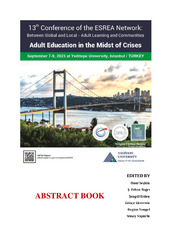Приказ основних података о документу
Socio-Educational Predictors of the Trust in Public Institutions in Serbia During the COVID-19 Crisis
| dc.contributor | Seçkin, Onur | |
| dc.contributor | Bağcı, Ş. Erhan | |
| dc.contributor | Erden, Şengül | |
| dc.contributor | Güvercin, Gökçe | |
| dc.contributor | Yengel, Begüm | |
| dc.contributor | Vapurlu, Simay | |
| dc.creator | Bulajić, Aleksandar | |
| dc.creator | Koruga, Nikola | |
| dc.creator | Nikolić, Tamara | |
| dc.date.accessioned | 2024-01-03T17:15:02Z | |
| dc.date.available | 2024-01-03T17:15:02Z | |
| dc.date.issued | 2023 | |
| dc.identifier.issn | 2980-115X | |
| dc.identifier.uri | http://reff.f.bg.ac.rs/handle/123456789/5960 | |
| dc.description.abstract | Since the emergence of COVID-19 epidemic, several studies addressed the question of which social factors can predict peoples’ readiness to adopt preventive/protective measures and behaviours in response to the pandemic1, 2, 3, 4, 9 . One of the most important significant predictor was shown to be confidence/trust in social, i.e. public institutions, such as health system, media and government4 , when controlled for additional factors e.g. affective-cognitive perceptions of the COVID-19 related crises, such as personal safety/risk and vulnerability. However, much less is known about which factors predict confidence in public institutions during the COVID19 crises. Confidence in social/public institutions represents the belief that those possess adequate competencies and the ability to manage public health crises, as well as public policies to be in the best interest of the population4, 5 . The latter we understand as trust. The definition is a nucleus of the recreancy theory which comprehends trust in public institutions as a threedimensional process (strong ties, weak ties, institutions)6 . We aim to explore the predictive value of three factors regarding the public institution trust (PIT): critical thinking dispositions (CTD), media literacy and basic values composition, when controlled for perceived risk/vulnerability to COVID-19. Critical thinking should not be considered only skills (the cognitive aspects), but the disposition to act and use those skills. In this research, we used the CTD scale which includes two domains: reflective scepticism and radical openness7 . This instrument is based on the idea that engagement in reflective scepticism, beside understanding of assumptions, context, and alternatives bring adults closer to ultimate explanations (Brookfiled)12 . Recent research suggest that individuals with higher level of media literacy are better prepared and more willing to take experts’ recommended preventive actions regarding COVID-19. Individuals with lower media literacy level, rather put trust in their own abilities to protect themselves8 . These findings indicate that PIT may be dependent on media literacy level (measured with News media literacy scale13). Such conclusions would make media education an important feature to include in health promotion campaigns and a subject of adult education programs on a more frequent basis. Several studies put the focus on the interaction of basic human values according to Schwartz model10 of values (see Short Schwartz value survey14) and compliance to institutional guidelines for preventive/protective measures during COVID-19 pandemic11. For example, it was found that the higher individual importance of values related to self-transcendence (e.g. responsibility) and conservation (e.g. security) the higher probability of compliance to COVID-19 protective behaviour guidelines11 . This correlational study is focused on finding the optimal model of prediction for PIT, composed of the abovementioned factors, including socio-demographic and ALE predictors. We hypothesise results would show a number of interactions between the given predictors and that the research could contribute to further understanding of the intertwinement of CTD, media literacy and basic values for health crisis management in general. | sr |
| dc.language.iso | en | sr |
| dc.publisher | Yetişkin Eğitimi Dergisi | sr |
| dc.rights | openAccess | sr |
| dc.rights.uri | https://creativecommons.org/licenses/by/4.0/ | |
| dc.source | Adult Education in the Midst of Crises - Abstract Book | sr |
| dc.subject | confidence in public institutions | sr |
| dc.subject | critical thinking dispositions | sr |
| dc.subject | media literacy | sr |
| dc.subject | basic human values | sr |
| dc.subject | COVID-19 | sr |
| dc.title | Socio-Educational Predictors of the Trust in Public Institutions in Serbia During the COVID-19 Crisis | sr |
| dc.type | conferenceObject | sr |
| dc.rights.license | BY | sr |
| dc.citation.epage | 32 | |
| dc.citation.spage | 29 | |
| dc.description.other | Adult Education in the Midst of Crises Proceedings of the 13th Conference of the ESREA Network ‘Between Global and Local – Adult Learning and Communities’ September 7-9, 2023 Yeditepe University İstanbul, Turkey | sr |
| dc.identifier.fulltext | http://reff.f.bg.ac.rs/bitstream/id/15023/esrea-2023-abstract-book.pdf | |
| dc.identifier.rcub | https://hdl.handle.net/21.15107/rcub_reff_5960 | |
| dc.type.version | publishedVersion | sr |

